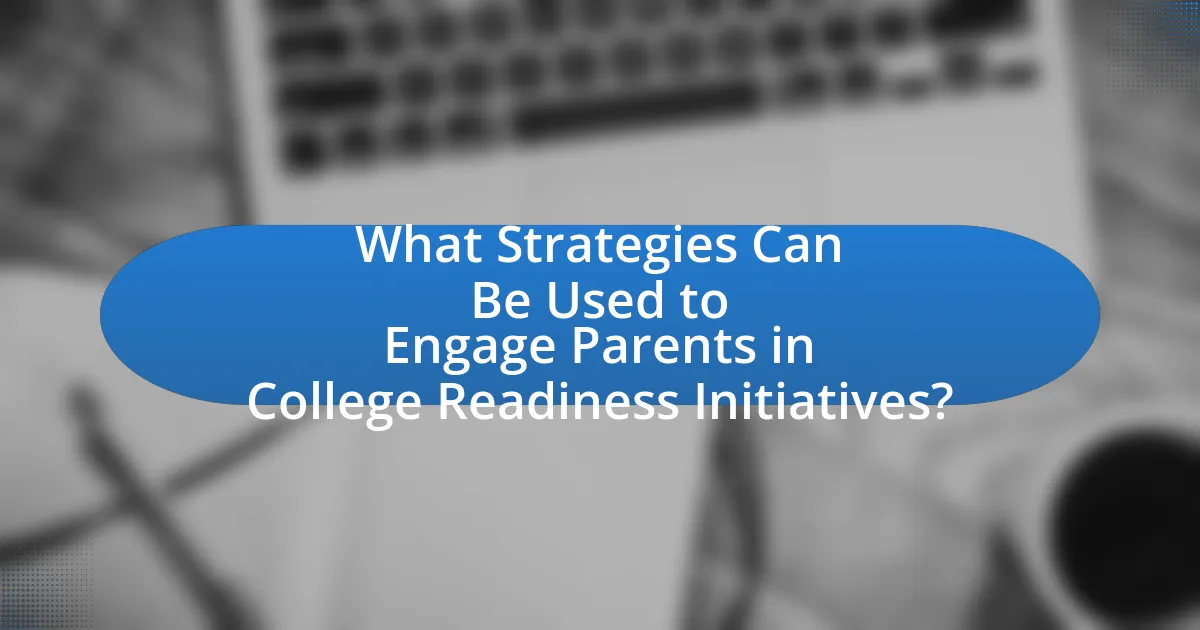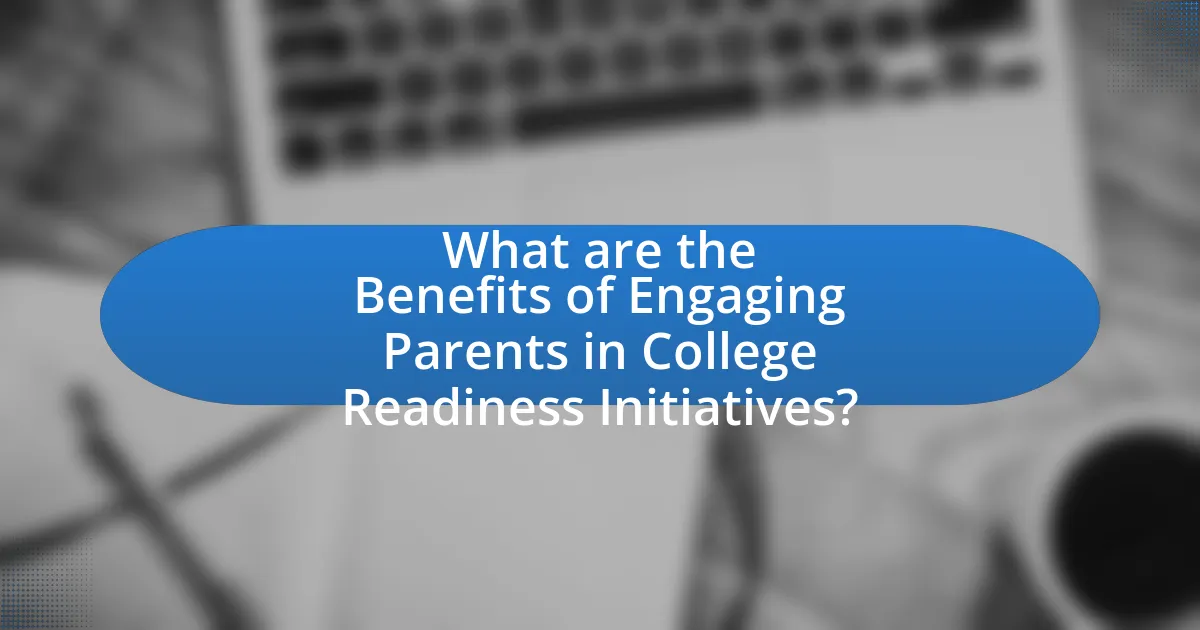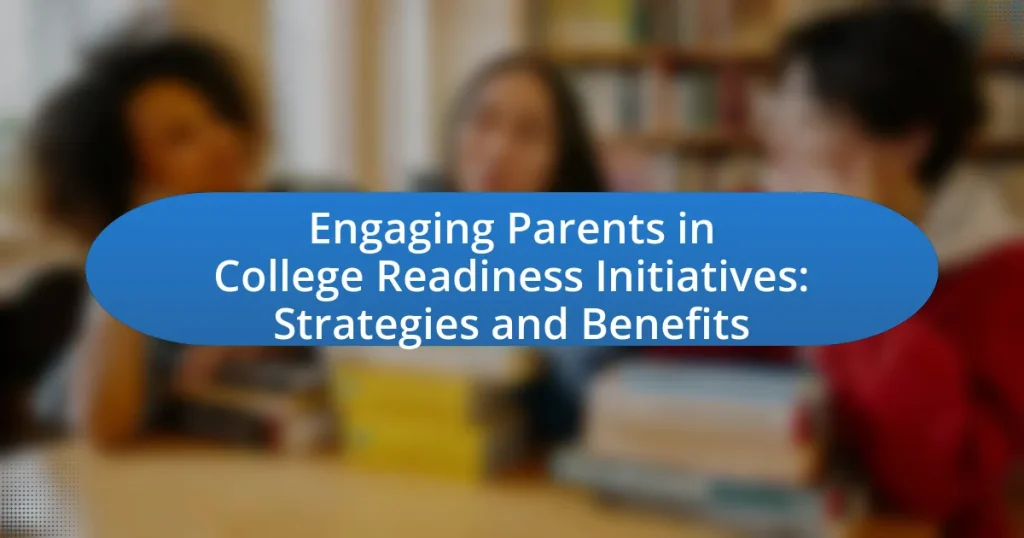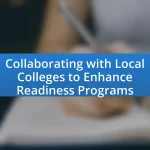The article focuses on engaging parents in college readiness initiatives, highlighting their significance in preparing high school students for postsecondary education. It outlines the benefits of these initiatives for students and families, including enhanced academic preparedness, increased college enrollment rates, and the development of essential skills such as critical thinking and effective communication. The article also discusses the crucial role of parental involvement in supporting student success, strategies for schools to effectively engage parents, and the long-term positive impacts of such engagement on students’ academic performance and post-secondary outcomes.

What are College Readiness Initiatives and Why are They Important?
College readiness initiatives are programs and strategies designed to prepare high school students for the academic and social demands of college. These initiatives are important because they enhance students’ skills, knowledge, and confidence, leading to higher enrollment and success rates in postsecondary education. Research indicates that students who participate in college readiness programs are more likely to complete college than those who do not, with studies showing a 20% increase in college enrollment rates among participants.
How do College Readiness Initiatives benefit students and families?
College readiness initiatives benefit students and families by enhancing academic preparedness and increasing access to higher education resources. These initiatives provide students with essential skills, such as critical thinking and time management, which are crucial for success in college. Additionally, they often include workshops and resources for families, helping them understand the college application process and financial aid options. Research indicates that students who participate in college readiness programs are more likely to enroll in postsecondary education; for instance, a study by the National Center for Education Statistics found that students from low-income families who engaged in such initiatives had a 20% higher college enrollment rate compared to those who did not. This increased engagement not only supports students academically but also empowers families to play an active role in their children’s educational journey.
What specific skills do these initiatives aim to develop in students?
These initiatives aim to develop critical thinking, effective communication, and problem-solving skills in students. By engaging parents in the college readiness process, students receive support that enhances their ability to analyze information, articulate their thoughts clearly, and approach challenges with innovative solutions. Research indicates that parental involvement positively influences academic performance and skill development, as evidenced by studies showing that students with engaged parents are more likely to excel in critical thinking tasks and collaborative projects.
How do these initiatives impact students’ academic performance?
Engaging parents in college readiness initiatives positively impacts students’ academic performance by enhancing their motivation and support systems. Research indicates that when parents are actively involved in their children’s education, students demonstrate higher grades, improved attendance, and increased likelihood of pursuing higher education. For instance, a study by the Harvard Family Research Project found that students whose parents engage in school activities are 30% more likely to achieve higher academic outcomes compared to those with less parental involvement. This correlation underscores the importance of parental engagement in fostering an environment conducive to academic success.
What role do parents play in College Readiness Initiatives?
Parents play a crucial role in College Readiness Initiatives by actively supporting their children’s academic and social development. Their involvement includes fostering a college-going culture at home, encouraging educational aspirations, and providing resources for academic success. Research indicates that students with engaged parents are more likely to achieve higher grades, attend school regularly, and enroll in postsecondary education. For instance, a study by the National Center for Education Statistics found that parental involvement positively correlates with students’ college readiness indicators, such as GPA and standardized test scores. This demonstrates that parents significantly influence their children’s preparedness for college through their active participation and support.
Why is parental involvement crucial for student success?
Parental involvement is crucial for student success because it significantly enhances academic performance and emotional well-being. Research indicates that students with engaged parents are more likely to achieve higher grades, attend school regularly, and complete homework consistently. A study by the National Center for Family & Community Connections with Schools found that parental involvement can lead to a 30% increase in student achievement. Furthermore, involved parents provide essential support that fosters a positive attitude toward education, which is linked to higher graduation rates and college enrollment.
How can parents support their children in preparing for college?
Parents can support their children in preparing for college by actively engaging in their academic and extracurricular activities. This involvement includes helping with homework, discussing college options, and encouraging participation in advanced placement courses or extracurricular programs that enhance college readiness. Research indicates that students whose parents are involved in their education are more likely to achieve higher academic performance and pursue higher education. For instance, a study by the National Center for Education Statistics found that parental involvement positively correlates with students’ educational aspirations and achievements.

What Strategies Can Be Used to Engage Parents in College Readiness Initiatives?
To engage parents in college readiness initiatives, schools can implement strategies such as organizing informational workshops, creating parent advisory committees, and utilizing digital communication platforms. Informational workshops provide parents with essential knowledge about college admissions processes, financial aid, and academic requirements, which can increase their involvement and support for their children. Parent advisory committees allow parents to voice their concerns and contribute to decision-making, fostering a sense of community and shared responsibility. Digital communication platforms, such as newsletters and social media groups, facilitate ongoing engagement by providing updates and resources, making it easier for parents to stay informed and connected. Research indicates that parental involvement positively impacts student achievement and college readiness, highlighting the importance of these strategies in fostering effective partnerships between schools and families.
How can schools effectively communicate with parents about these initiatives?
Schools can effectively communicate with parents about college readiness initiatives by utilizing multiple channels such as newsletters, social media, and parent-teacher meetings. These methods ensure that information reaches parents in a timely and accessible manner. For instance, a study by the National Center for Family & Community Connections with Schools highlights that regular communication through diverse platforms increases parental engagement and awareness of school initiatives. Additionally, schools can host workshops and informational sessions to provide detailed insights into the initiatives, fostering a collaborative environment. This approach not only informs parents but also encourages their active participation in supporting their children’s college readiness.
What communication channels are most effective for reaching parents?
Email and text messaging are the most effective communication channels for reaching parents. Research indicates that 90% of parents prefer receiving school-related information via email, while text messages have a 98% open rate, making them highly effective for immediate communication. These channels facilitate timely updates and engagement, ensuring parents stay informed about their children’s college readiness initiatives.
How can schools tailor messages to different parent demographics?
Schools can tailor messages to different parent demographics by utilizing targeted communication strategies that consider cultural, linguistic, and socioeconomic factors. For instance, schools can segment their parent population based on these demographics and customize messages to resonate with each group, such as translating materials into multiple languages for non-English speaking families or using culturally relevant examples that reflect the values and experiences of diverse communities. Research indicates that personalized communication increases engagement; a study by the National Center for Family and Community Connections with Schools found that tailored messages significantly improve parental involvement in educational initiatives.
What types of programs can schools implement to involve parents?
Schools can implement various programs to involve parents, including parent-teacher conferences, workshops on academic support, and volunteer opportunities. Parent-teacher conferences facilitate direct communication between educators and parents, allowing for discussions about student progress and ways to support learning at home. Workshops can educate parents on topics such as college readiness, financial aid, and effective study habits, equipping them with tools to assist their children. Additionally, volunteer opportunities in classrooms or school events encourage parental participation and foster a sense of community, which has been shown to positively impact student achievement and engagement.
What workshops or seminars can be offered to educate parents?
Workshops and seminars that can be offered to educate parents include college readiness programs, financial aid workshops, and parenting skills seminars focused on academic support. College readiness programs provide parents with information on the college application process, admission requirements, and how to support their child’s academic journey. Financial aid workshops educate parents about scholarships, grants, and student loans, helping them understand the financial aspects of college. Parenting skills seminars focus on effective communication and study habits that can enhance a child’s educational experience. These educational offerings are essential as they empower parents to actively participate in their child’s college readiness, ultimately leading to better outcomes for students.
How can schools create volunteer opportunities for parents?
Schools can create volunteer opportunities for parents by establishing clear communication channels and identifying specific needs within the school community. For instance, schools can organize events such as parent-teacher conferences, workshops, or community service days where parents can participate actively. Research indicates that schools with strong parental involvement see improved student outcomes, as highlighted in the study “The Impact of Parental Involvement on Academic Achievement” by Fan and Chen, which emphasizes the correlation between parental engagement and student success. By providing structured roles, such as classroom helpers, event coordinators, or advisory committee members, schools can effectively engage parents in meaningful ways that support both the school environment and student readiness for college.

What are the Benefits of Engaging Parents in College Readiness Initiatives?
Engaging parents in college readiness initiatives significantly enhances student outcomes. Research indicates that when parents are involved, students are more likely to achieve higher academic performance, maintain better attendance, and exhibit increased motivation towards their education. For instance, a study by the Harvard Family Research Project found that students with engaged parents are 20% more likely to enroll in college compared to their peers with less parental involvement. Additionally, parental engagement fosters a supportive home environment that encourages educational aspirations and goal-setting, which are critical for college readiness.
How does parental engagement influence student outcomes?
Parental engagement significantly enhances student outcomes by fostering academic achievement, improving behavior, and increasing graduation rates. Research indicates that students with involved parents are more likely to earn higher grades and test scores, as well as have better attendance records. For instance, a study published in the “Review of Educational Research” found that parental involvement is positively correlated with students’ academic performance across various age groups and demographics. This engagement also promotes a supportive home environment that encourages educational aspirations, leading to higher rates of college enrollment and completion.
What evidence supports the link between parental involvement and college readiness?
Parental involvement significantly enhances college readiness among students. Research indicates that students with engaged parents are more likely to achieve higher academic performance, maintain better attendance, and develop positive attitudes toward education. A study by the National Center for Education Statistics found that students whose parents are involved in their education are 20% more likely to enroll in postsecondary education. Additionally, a meta-analysis published in the Review of Educational Research highlighted that parental involvement positively correlates with students’ academic success and college aspirations, emphasizing the importance of parents in fostering an environment conducive to higher education readiness.
How can engaged parents positively affect school culture?
Engaged parents can positively affect school culture by fostering a collaborative environment that enhances student achievement and well-being. When parents actively participate in school activities, they contribute to a sense of community and shared responsibility, which research shows leads to improved student performance and lower dropout rates. For instance, a study by the National Education Association found that students whose parents are involved in their education are more likely to earn higher grades and have better attendance. This involvement also encourages open communication between parents and educators, creating a supportive atmosphere that values student input and promotes a positive school climate.
What long-term benefits can arise from engaging parents in these initiatives?
Engaging parents in college readiness initiatives can lead to improved academic outcomes for students over the long term. Research indicates that when parents are actively involved, students are more likely to achieve higher grades, complete homework consistently, and have better attendance rates. For instance, a study by the Harvard Family Research Project found that students whose parents are engaged in their education are 20% more likely to graduate from high school and pursue higher education. Additionally, parental involvement fosters a supportive home environment that encourages educational aspirations, leading to increased college enrollment rates. These benefits demonstrate the critical role parents play in shaping their children’s academic success and future opportunities.
How does parental engagement contribute to community support for schools?
Parental engagement significantly enhances community support for schools by fostering collaboration and resource sharing. When parents actively participate in school activities, they create a network of support that encourages local businesses and organizations to contribute resources, such as funding, mentorship, and volunteer efforts. Research indicates that schools with high levels of parental involvement often see improved student outcomes, which in turn motivates community members to invest in educational initiatives. For example, a study by the Harvard Family Research Project found that schools with engaged parents are more likely to receive community support, leading to increased funding and resources that benefit the entire educational ecosystem.
What impact does it have on students’ post-secondary success?
Engaging parents in college readiness initiatives significantly enhances students’ post-secondary success. Research indicates that parental involvement positively correlates with higher academic achievement, increased college enrollment rates, and improved persistence in higher education. For instance, a study by the National Center for Education Statistics found that students whose parents actively participated in their education were 20% more likely to enroll in college compared to those with less parental engagement. This involvement often leads to better preparation for college-level work, fostering skills and attitudes that contribute to academic resilience and success in post-secondary environments.
What are some best practices for schools to enhance parental engagement?
Schools can enhance parental engagement by implementing regular communication strategies, such as newsletters, emails, and parent-teacher conferences. These methods keep parents informed about school activities and their child’s progress, fostering a collaborative environment. Research indicates that schools with effective communication practices see a 30% increase in parental involvement, which positively impacts student achievement. Additionally, schools can organize workshops and informational sessions focused on college readiness, equipping parents with the knowledge to support their children’s educational goals. Engaging parents in decision-making processes, such as forming advisory committees, also strengthens their connection to the school community.
How can schools assess the effectiveness of their engagement strategies?
Schools can assess the effectiveness of their engagement strategies by utilizing surveys, attendance records, and academic performance metrics. Surveys can gather feedback from parents and students about their experiences and perceptions of engagement initiatives, providing direct insights into their effectiveness. Attendance records can indicate participation levels in school events and programs, reflecting the interest and involvement of families. Additionally, analyzing academic performance metrics, such as student grades and college readiness indicators, can help determine if increased engagement correlates with improved educational outcomes. Research shows that schools with higher parental involvement often see better student performance, reinforcing the importance of effective engagement strategies.
What common challenges do schools face in engaging parents, and how can they be overcome?
Schools commonly face challenges such as communication barriers, lack of time, and differing cultural expectations when engaging parents. To overcome these challenges, schools can implement regular, clear communication through multiple channels, such as newsletters, social media, and parent-teacher meetings, ensuring that information is accessible and understandable. Additionally, schools can offer flexible meeting times and virtual options to accommodate parents’ schedules, thereby increasing participation. Providing culturally relevant resources and training for staff can also help bridge cultural gaps and foster a more inclusive environment. Research indicates that effective parent engagement strategies can lead to improved student outcomes, highlighting the importance of addressing these challenges.


